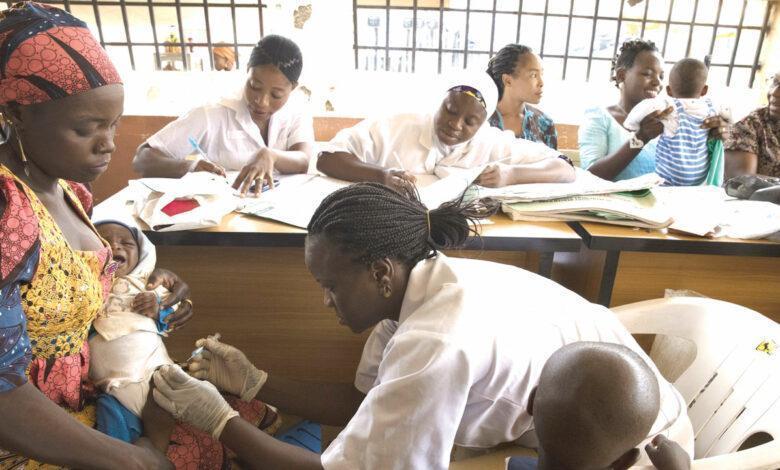
10 Major Health Challenges In Nigeria
Major Health Challenges In Nigeria – Health challenges in Nigeria are a major concern. With a growing population, limited access to quality healthcare, and inadequate health infrastructure, Nigeria is facing a health crisis. Many Nigerians struggle with preventable illnesses, infectious diseases, and chronic conditions that go untreated. In this blog, we’ll explore the root causes of these health challenges and discuss possible solutions. From the lack of clean water and sanitation systems to the high cost of medical care, we’ll delve into the issues that keep so many Nigerians from living healthy lives. And we’ll talk about innovative ways to tackle these challenges, including community-led health initiatives and government programs that are making a difference. So, if you’re interested in learning about the health challenges facing Nigeria and what can be done to address them, this is the blog for you!Major Health Challenges In Nigeria
Understanding the Current State of Healthcare in Nigeria
“Healthcare in Nigeria” is a topic that’s top of mind for many Nigerians. The current state of healthcare in the country is, unfortunately, far from ideal. The healthcare system is plagued by numerous challenges, including a shortage of healthcare facilities, inadequate funding, and an insufficient number of healthcare workers. These issues have led to a situation where many Nigerians struggle to access basic healthcare services.
👉 Relocate to Canada Today!
Live, Study and Work in Canada. No Payment is Required! Hurry Now click here to Apply >> Immigrate to CanadaThe impact of these challenges is felt by both the rich and poor. Even those who can afford to pay for private healthcare are often left dissatisfied with the quality of services they receive. This is a major problem for a country with a rapidly growing population and a high burden of disease.Romantic Love Messages
Read Also: 10 Major Problems Facing Education In Nigeria
The government plays a crucial role in addressing these challenges. Despite making some attempts to improve the healthcare system, much more needs to be done. The government needs to increase its funding for healthcare and implement policies that will attract and retain healthcare workers. The private sector also has a role to play in improving healthcare in Nigeria.Information Guide Nigeria
Overview of Health Challenges in Nigeria
Nigeria faces a host of health challenges that affect its citizens, ranging from infectious diseases to chronic health conditions. Malaria, tuberculosis, and HIV/AIDS are among the top infectious diseases in the country. There’s also a rising trend of non-communicable diseases like diabetes, heart disease, and cancer. This is partly due to changes in lifestyle and diet.
Access to quality healthcare is a major issue, as many Nigerians live in rural areas with limited access to medical facilities. Even in urban areas, the healthcare system is plagued by inadequate funding and a shortage of healthcare workers. This leads to long wait times, subpar care, and a lack of preventive services.
To tackle these health challenges, the government needs to invest in healthcare infrastructure and increase funding for research and development. Additionally, increasing public education about healthy lifestyle choices and access to preventive care is crucial. The private sector can also play a role by providing healthcare services and investing in medical research.
10 Major Health Challenges In Nigeria
- Malaria: A Major Threat
Malaria is one of the leading causes of death in Nigeria, with over 100 million cases reported annually. The disease is spread by infected mosquitoes and can cause severe illness and even death if left untreated.
Read Also: 10 Importance of June 12 in Nigeria
👉 Relocate to Canada Today!
Live, Study and Work in Canada. No Payment is Required! Hurry Now click here to Apply >> Immigrate to Canada- Tuberculosis: A Growing Concern
Tuberculosis (TB) is another major health challenge in Nigeria, with an estimated 500,000 new cases reported each year. The disease spreads through the air and can lead to serious health complications if not treated promptly.Good Morning Love Message
- The Spread of HIV/AIDS:
Nigeria has one of the highest rates of HIV/AIDS in the world, with over 3 million people living with the disease. The spread of HIV/AIDS is fueled by a lack of education about safe sex practices and the stigma associated with the disease.
- The Rise of Non-Communicable Diseases:
In recent years, there has been a sharp increase in the number of cases of non-communicable diseases, such as diabetes, heart disease, and cancer. These diseases are often linked to lifestyle choices, such as unhealthy diets and lack of physical activity.Jhpiego Nigeria Job Recruitment 2023(6 Positions)
- Limited Access to Quality Healthcare:
Many Nigerians live in rural areas with limited access to medical facilities, making it difficult to receive proper care for health problems. Even in urban areas, the healthcare system is often underfunded and understaffed, leading to long wait times and subpar care.
- Shortage of Healthcare Workers:
There is a critical shortage of healthcare workers in Nigeria, which exacerbates the already inadequate access to quality care. This shortage is due to a lack of training opportunities, low salaries, and limited job opportunities in the healthcare sector.
- Inadequate Funding for Healthcare:
The Nigerian government has historically allocated very limited funds to the healthcare sector, resulting in poor infrastructure, limited access to medical supplies, and a lack of preventive services.
Read Also: 10 Best University In Nigeria For Nursing
- Lack of Public Education About Health:
There is a lack of public education about healthy lifestyle choices and the importance of preventive care in Nigeria. This leads to a lack of understanding about how to maintain good health and prevent the spread of diseases.
- Stigma Associated with Mental Health:
Mental health is another critical issue in Nigeria, with a high incidence of depression and anxiety. However, there is often a stigma associated with mental health problems, which prevents people from seeking help and receiving proper care.NYSC Portal
- Poor Sanitation and Hygiene Conditions:
Poor sanitation and hygiene conditions in Nigeria contribute to the spread of infectious diseases and other health problems. Improving sanitation and promoting good hygiene practices are crucial for reducing the incidence of disease and improving overall health.
10 Key Challenges Facing Nigeria’s Health System
- Lack of Access to Healthcare:
One of the major challenges facing Nigeria’s health system is the lack of access to healthcare. Many rural areas lack adequate medical facilities, and even in urban areas, many people can’t afford the cost of medical services. This has resulted in many people relying on traditional medicine or self-medicating, which often leads to further health problems.Duties of a U-Haul Customer Service
- Poor Quality of Healthcare:
Another issue is the poor quality of healthcare. Many medical facilities are understaffed and lack basic equipment, supplies, and medicines. This means that patients often receive substandard care, which can lead to further health problems and even death.
- High Costs of Medical Services:
The high cost of medical services is another challenge facing Nigeria’s health system. Many people can’t afford to pay for medical treatment, which means they go without care or seek help from traditional healers. This can result in health problems going untreated or getting worse, and also puts a strain on the economy.
- Corruption:
Corruption is a major challenge in Nigeria’s health system. Many healthcare facilities are poorly managed, and officials often misappropriate funds meant for healthcare. This results in a lack of funding for essential medical services and equipment, which affects the quality of care people receive.
Read Also: 10 Problems Facing Museum Management In Nigeria
- Lack of Skilled Medical Personnel:
Another challenge is the lack of skilled medical personnel. Many medical facilities are understaffed, and there is a shortage of qualified doctors, nurses, and other medical professionals. This means that patients often receive substandard care and treatments are delayed, leading to further health problems.
- Insufficient Health Insurance Coverage:
Insufficient health insurance coverage is another challenge facing Nigeria’s health system. Many people don’t have health insurance and even those who do often find that their coverage is limited. This means that many people can’t afford to pay for medical treatment, and they often go without care.
- Lack of Awareness About Health Issues:
Many people in Nigeria lack awareness about health issues, and they often don’t understand how to prevent illnesses or what to do if they become sick. This lack of knowledge can lead to health problems going untreated, or people seeking treatment from traditional healers or self-medicating, which can lead to further health problems.
- Poor Sanitation and Hygiene:
Poor sanitation and hygiene are also major challenges in Nigeria’s health system. Many people don’t have access to clean water, and they live in unsanitary conditions, which increases the risk of illnesses and infections. This can lead to outbreaks of disease, which can further strain the health system.
- Limited Access to Medical Supplies and Equipment:
Limited access to medical supplies and equipment is another challenge facing Nigeria’s health system. Many medical facilities don’t have the equipment or supplies they need to provide quality care, which can lead to delays in treatment and substandard care. This can result in health problems going untreated or getting worse.
- Political Instability:
Political instability is a major challenge in Nigeria, and it affects the health system in several ways. Healthcare facilities are often targets during the conflict, and political instability can lead to funding cuts for essential medical services and supplies. This can result in a lack of care for people in need and further strain on the health system.JAMB Portal
Read Also: 10 social challenges in Nigeria
Conclusion
In conclusion, Nigeria faces a multitude of health challenges, ranging from infectious diseases to non-communicable diseases, and a lack of access to quality healthcare. Addressing these challenges requires a multifaceted approach, including increased government funding for healthcare, public education about healthy lifestyle choices, and a focus on improving access to care for all Nigerians.








